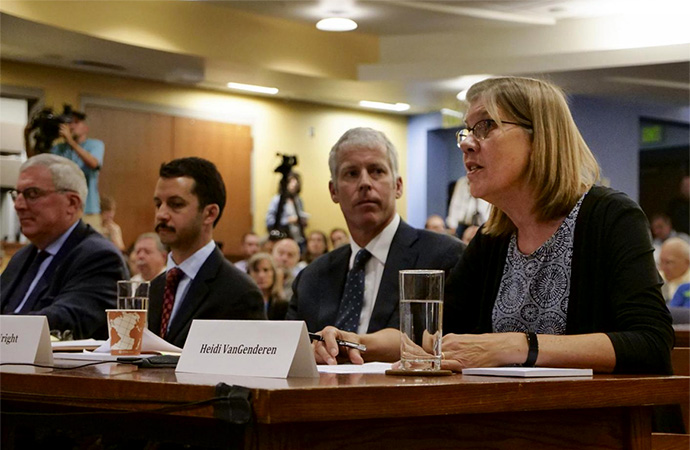The Kids Are All Right Adults Are the Climate Change Problemby Max Boykoff Originally published in The Daily Camera on September 5, 2019 |
Heidi VanGenderen, Chief Sustainability Officer for the University of Colorado Boulder, testifies during the House Select Committee on the Climate Crisis hearing on campus. Photo: Casey A. Cass. |
I have been deeply disturbed by the “Greta bashing” going on. My disappointment has been compounded by the fact that the verbal attacks have overwhelmingly emanated from older adults. For those not following her more closely, Greta Thunberg is a 16-year old Swedish activist who began demonstrating outside Swedish parliament to raise the need for urgent action on climate change. Her commitment has sparked the Youth Climate Strikes over the past year. On Aug. 28, the young climate activist just completed her cross-Atlantic trip by sailboat to New York City. She has arrived for the United Nations General Assembly and Climate Week, punctuated by two widely anticipated Youth Climate Strikes taking place mid- to late-September. Climate change is set to feature extensively in the news this month. “Kids today” has been a common utterance laced with exasperation and disappointment that many of us have likely heard throughout our lives. Commonly disparaging comments about millennials, Generation Y and Z are that they are lazy, delicate, sensitive, fragile, narcissistic, selfish and entitled. These disparaging comments point to assumptions that adults lead the way in work ethic, resilience, altruism and morality. On climate change, the opposite has been shown to be true. Evidence abounds. In June, polling data from the Yale Program on Climate Change Communication and the George Mason University Center for Climate Change Communication showed that younger generations are more likely to view climate change as personally important while they are more willing to take action on climate change than older generations. This is consistent with Gallup polling from last year that found 70% of people ages 18-34 say they worry about climate change, contrasted with 56% of those over age 55. Moreover, Pew Research Center polling shows that younger conservative voters are confronting climate change in much higher numbers than their conservative elders: Twice as many young Republicans (ages 23-38) than older Republicans (over age 52) say that humans contribute to climate change and effects are being felt now in the United States. Maybe we can attribute this difference in part to the powerful intoxicant called nostalgia. This often involves a yearning for an idyllic past and romanticized times gone by. But nostalgia is troubling for many reasons. Among them, it looks backward rather than forward. Problematically, nostalgia may also emanate from feelings that “things aren’t what they used to be.” Well, things aren’t what they used to be. On climate change, National Oceanic and Atmospheric Administration data show that anyone born after December 1984 (currently people up to 34 years old) has not experienced a below average month of global temperatures. Decisions made in the good old days have led us to the present predicament. I worry that we adults, who got us into this mess, are not doing enough as the kids they have introduced to climate challenges. Adult utterances about “legacies” and “intergenerational” generally ring hollow when the scale of engagement and action pales in comparison to the scale of the ongoing challenge. With all this in mind, young people have valid reasons for feeling angry, anxious or melancholy about the state of human-environment conditions today. However, many young people are not merely accepting the state of affairs as they are. Many are now creatively expressing visions for different futures. Leaders like Thunberg have been met by other young voices, such as indigenous environmental leader and musician Xiuhtezcatl Martinez, as well as filmmaker Slater Jewell-Kemker, to meet the scale of these climate challenges with commensurate promise and resolve. |
Xiuhtezcatl Martinez visits Max Boykoff’s Environmental Studies course in 2018. |
Through creative communications, younger generations are expressing their ambitions and concerns about climate change more than ever before. Whether by choice or by necessity, many younger people are both talking the talk and walking the walk. The Youth Climate Strikes and youth presence at the UN and Climate Week next month and beyond may be one sign that young people are pulling on levers of change available to them: voice through creativity and protest. U.S. comedian Stephen Colbert has joked, “I don’t trust young people. They’re here to replace us.” In reality, though, going forward using informed, decidedly and constructively optimistic approaches are critical. Communications approaches that empower youth to make change can be effective, as is listening to their perspectives, minimizing their burdensome worries and amplifying their voices as new knowledge brokers in a contemporary communications environment. Trust in this next generation of leaders and trust in progress in creatively communicating about climate change are vital to effectively tackling this 21st century challenge. The kids are alright, adults must step up. |
 Maxwell Boykoff Maxwell Boykoffboykoff@colorado.edu Director, Center for Science and Technology Policy Research |



